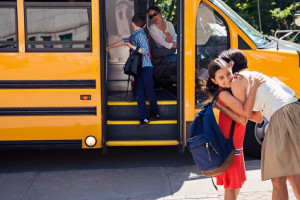
Children react differently to the thought of going back to school in the fall. Average students are disinterested. Good students are excited. Poor students are averse to going back to school. Gifted and talented students can be very anxious.
The school environment is a structured setting and far different from the freedom of summer vacation. It looms as a stressful experience for gifted and talented students in a number of different ways, from intellectual and emotional pressures to physical and social difficulties.
There are some steps you as a gifted and talented parent can take to alleviate some of this stress and prepare your child for the coming school year. Here are a few suggestions.
Talk about the coming school year with your child
Prepare your child for the coming school year by discussing with her what she should expect. There will be a new classroom with a new teacher and new classmates. There will be different homework, different books, and different expectations for behavior.
There may be a new school if moving from an elementary school to a middle school or high school. This might call for discussions of a new location and timetable for getting there.
There may be a larger class size with more distractions. A new school year may include expectations for more independent study, time management or other executive-function responsibilities.
You can also talk about the previous year and what things happened for good or bad and what your child may do differently in these same situations during the coming year. A little review might be a good refresher for the kinds of activities or events that cause anxiety over and over again and how best to handle them.
Take advantage of orientations
Take your child to school for a visit, especially if it is a new school. This will help orient your child to new surroundings and alleviate some of her fears of the unknown. Show your child the playground and climbing structures or activity fields. Give them a positive image of going to school.
Some schools give orientations to students and their parents. Take advantage of these opportunities to increase your own comfort level for future discussions with school personnel when the need arises.
If there is no orientation, take your child to the school for a little exploration. Take a walk through the school with your child, check out the main office, a few classrooms, the school library and the bathrooms. Familiarity with these will bring some calmness to your child ahead of school opening.
Orientation can include peers as well. If you know of other children in the same circumstance as your child, see if you can get them together informally before school starts. Going to a new school or classroom with someone you know helps reduce anxiety.
Change your gifted and talented child’s mindset
Hopefully, summer has been a good experience for your child. It was time for less anxiety and a more relaxed period of enjoyable activities. She probably had a mindset of casual learning. The change to a school setting can be traumatic if the child is not mentally and emotionally ready to recognize and accept that change.
Gifted and talented students may have intellectual or psychomotor intensities that should be considered and discussed with parents as the school year approaches. The students have addressed boredom with summer activities they liked. In the coming school year, they may be facing it again with fewer options. Students will be asked to pay attention, focus more, and sit for longer periods of time.
Helping change your child’s mindset for a more structured environment will get her on the right course of mindfulness required for the demands ahead. How can you manage this change as a parent? One way is through role play.
Role play to simulate challenges
Discussing expectations and changes with your child will help her see what changes lay ahead. Nothing can prepare her better than a live experience that simulates those changes. You can sit down with your child at the kitchen table and rehearse situations that can come up in school.
Sometimes called preparing for “fire-fighting,” these simulations help children visualize experiences that make them uncomfortable and learn how to better cope with them when they do occur.
What situations cause your child to blurt out in class? You can have your child practice waiting her turn while someone else (you, in this case) reads out loud. You are teaching patience as an experience here.
You can teach your child to listen and try to guess what word comes next from the reading. You can suggest some reward system like tallying a point for every correct guess and showing the tally to you for some prize or incentive.
Role play at home is also a great precursor to role play in the classroom. This is a great learning tool where real-world problems are simulated in classroom projects. Classic subjects like math, science and engineering are combined to provide solutions. You can help your child become more comfortable with this style of learning. It is especially valuable to a gifted student.
Help with organization challenges
What kinds of organizational tools can you give your child to help with school life? What strategies work best for your child? It could be a certain style of backpack with accessible pockets. It could be a binder or notebook with section dividers. It might be the use of color coding. It might be maps, charts or daily briefs of some kind. It also might be electronic tools.
Whatever these helpful tools are, you should go over them with your child before school starts. Have your child practice with them until she feels comfortable. Go through the daily school routine with your child to see how often and under which circumstances backpacks and binders will be organized, emptied and refilled.
How will your child get homework instructions? How will you know what the daily expectations of the teacher are? How will you know about long-term assignments? You may want to let the teacher know that organization is an issue for your child, and teacher to parent communications is important.
Ask the teacher if there is a website where the school and teacher list the daily and long-term assignments so parents can follow along and assist their children with the schedules.
As a parent, you should address your own organizational skills. You need to be aware of the organizational needs of your child and come up with a plan to address each of them. You need to find time to spend on making your own lists, getting materials, contacting teachers, and discussing and practicing with your child. Organization is as important for you as it is for your child.
 Talk to school officials
Talk to school officials
You want to make sure the school personnel are aware of your child’s special needs. You should talk with the school principal, teachers, nurses, and social/psychological workers. They might be part of the educational plan that is prepared for your child (if one is needed and determined through testing, etc.).
You can discuss specifics with teachers, like saying your child struggles with loud noises or has a fear of reading aloud in a group. You can discuss specific health concerns with nurses, such as allergies or prescription medicines and possible side effects.
You might also want to set up some kind of review schedule with school officials so you can check on your child’s progress and any challenges. This can be a separate schedule from regular parent-teacher conferences held as a standard policy in most schools. But you can use them as well to advocate for your gifted child.
You don’t have to have a problem to speak with school officials about your child. You just want to know if your child is moving along the growth path academically and emotionally as you intended.
Communications is the key to success in the coming school year. Talk to school professionals, pay attention to school communications, anticipate school needs, prepare a plan for your child, and have discussions with your child relative to the new environment.
You will have adequately prepared your child for a great coming year in school.




